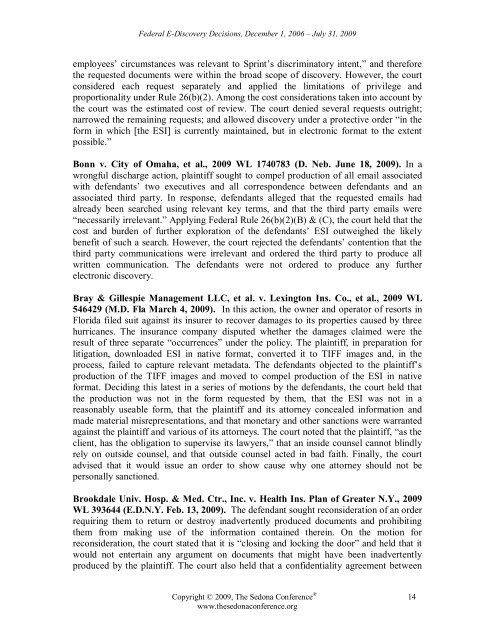Federal Court Decisions Involving Electronic Discovery, December 1 ...
Federal Court Decisions Involving Electronic Discovery, December 1 ...
Federal Court Decisions Involving Electronic Discovery, December 1 ...
Create successful ePaper yourself
Turn your PDF publications into a flip-book with our unique Google optimized e-Paper software.
<strong>Federal</strong> E-<strong>Discovery</strong> <strong>Decisions</strong>, <strong>December</strong> 1, 2006 – July 31, 2009<br />
employees’ circumstances was relevant to Sprint’s discriminatory intent,” and therefore<br />
the requested documents were within the broad scope of discovery. However, the court<br />
considered each request separately and applied the limitations of privilege and<br />
proportionality under Rule 26(b)(2). Among the cost considerations taken into account by<br />
the court was the estimated cost of review. The court denied several requests outright;<br />
narrowed the remaining requests; and allowed discovery under a protective order “in the<br />
form in which [the ESI] is currently maintained, but in electronic format to the extent<br />
possible.”<br />
Bonn v. City of Omaha, et al., 2009 WL 1740783 (D. Neb. June 18, 2009). In a<br />
wrongful discharge action, plaintiff sought to compel production of all email associated<br />
with defendants’ two executives and all correspondence between defendants and an<br />
associated third party. In response, defendants alleged that the requested emails had<br />
already been searched using relevant key terms, and that the third party emails were<br />
“necessarily irrelevant.” Applying <strong>Federal</strong> Rule 26(b)(2)(B) & (C), the court held that the<br />
cost and burden of further exploration of the defendants’ ESI outweighed the likely<br />
benefit of such a search. However, the court rejected the defendants’ contention that the<br />
third party communications were irrelevant and ordered the third party to produce all<br />
written communication. The defendants were not ordered to produce any further<br />
electronic discovery.<br />
Bray & Gillespie Management LLC, et al. v. Lexington Ins. Co., et al., 2009 WL<br />
546429 (M.D. Fla March 4, 2009). In this action, the owner and operator of resorts in<br />
Florida filed suit against its insurer to recover damages to its properties caused by three<br />
hurricanes. The insurance company disputed whether the damages claimed were the<br />
result of three separate “occurrences” under the policy. The plaintiff, in preparation for<br />
litigation, downloaded ESI in native format, converted it to TIFF images and, in the<br />
process, failed to capture relevant metadata. The defendants objected to the plaintiff’s<br />
production of the TIFF images and moved to compel production of the ESI in native<br />
format. Deciding this latest in a series of motions by the defendants, the court held that<br />
the production was not in the form requested by them, that the ESI was not in a<br />
reasonably useable form, that the plaintiff and its attorney concealed information and<br />
made material misrepresentations, and that monetary and other sanctions were warranted<br />
against the plaintiff and various of its attorneys. The court noted that the plaintiff, “as the<br />
client, has the obligation to supervise its lawyers,” that an inside counsel cannot blindly<br />
rely on outside counsel, and that outside counsel acted in bad faith. Finally, the court<br />
advised that it would issue an order to show cause why one attorney should not be<br />
personally sanctioned.<br />
Brookdale Univ. Hosp. & Med. Ctr., Inc. v. Health Ins. Plan of Greater N.Y., 2009<br />
WL 393644 (E.D.N.Y. Feb. 13, 2009). The defendant sought reconsideration of an order<br />
requiring them to return or destroy inadvertently produced documents and prohibiting<br />
them from making use of the information contained therein. On the motion for<br />
reconsideration, the court stated that it is “closing and locking the door” and held that it<br />
would not entertain any argument on documents that might have been inadvertently<br />
produced by the plaintiff. The court also held that a confidentiality agreement between<br />
Copyright © 2009, The Sedona Conference ® 14<br />
www.thesedonaconference.org
















